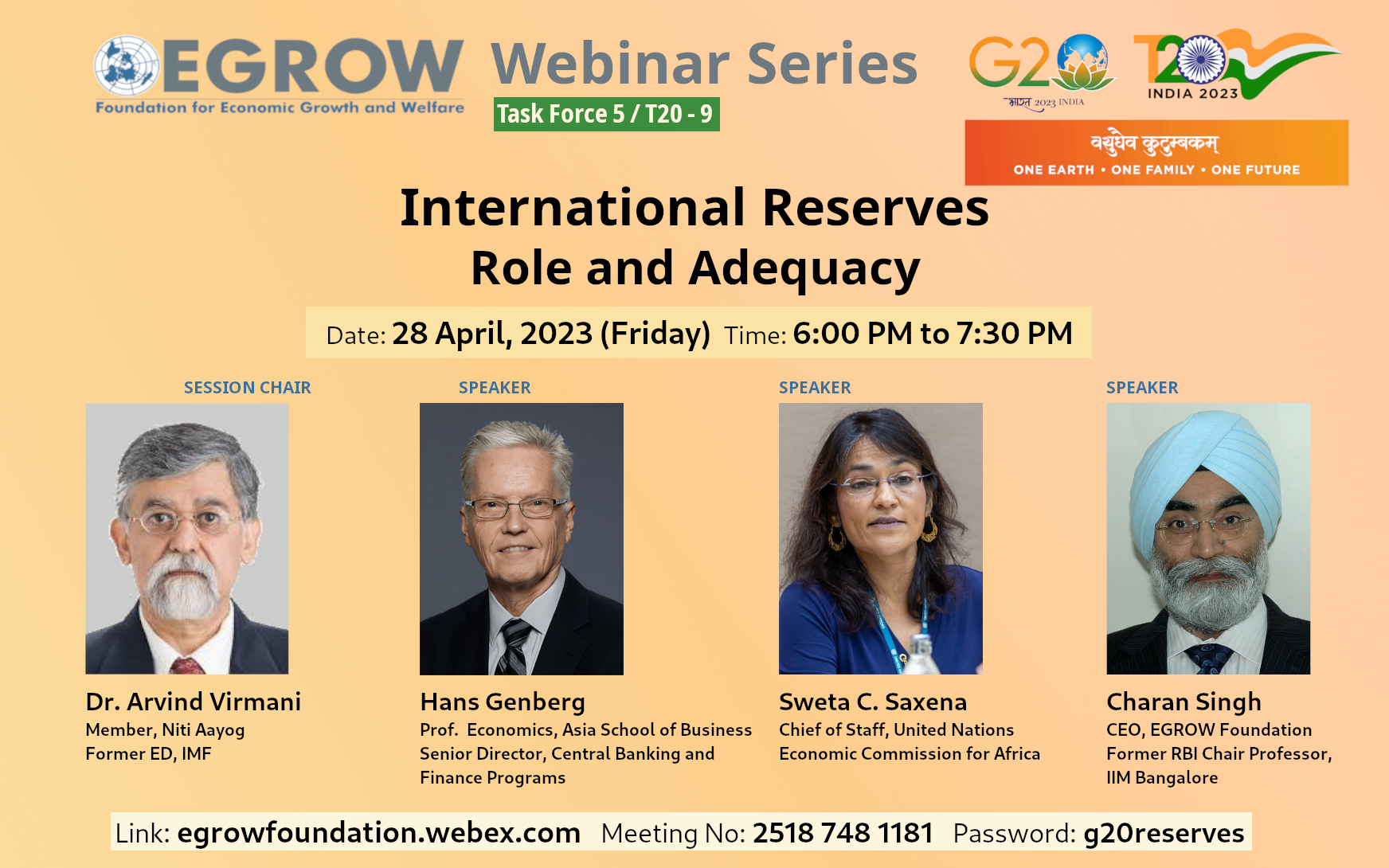International Reserves: Role and Adequacy

Webinar Link
Meeting No: 2518 748 1181
Password: g20reserves
Certificate of Participants
To recieve certificates, please register and attend
Abstract
International reserves are a stock of foreign currency assets held by central banks or monetary authorities, typically consisting of foreign currencies, gold, and other reserve assets. The primary role of international reserves is to help stabilize a country's exchange rate and provide liquidity to the economy in times of financial stress. Central banks can use reserves to intervene in the foreign exchange market by buying or selling their own currency to influence its value.
Moreover, international reserves play a crucial role in supporting international trade and investment. Countries with strong international reserves are better able to finance their imports and pay off their external debt. In addition, reserves can serve as a buffer against external shocks, such as sudden changes in commodity prices, global financial crises, or natural disasters.
The adequacy of international reserves varies depending on a country's specific economic circumstances, including its external debt, trade balance, capital flows, and financial sector stability. The International Monetary Fund (IMF) has developed guidelines to assess the adequacy of reserves, suggesting that reserves should cover at least three months of imports and short-term external debt, and that reserves should be sufficient to provide a cushion against external shocks. The panelists shall deliberate how international reserves can act as an important tool to maintain macroeconomic stability and promote international trade and investment.
About the Speakers
Dr. Arvind Virmani
Arvind Virmani is member of NIti Aayog. He was Chairman of the Foundation for Economic Growth and Welfare (EGROW) and President of the Forum For Strategic Initiatives (FSI, Delhi). He has been a Mentor (economic policy) to FICCI & a member of RBI Technical Advisory Committee on Monetary policy.
He was earlier Executive Director, IMF and Chief Economic Advisor, Ministry of Finance and Principal Advisor, Planning Commission. During his tenure he advised on a host of economic policy reforms, through 100s of policy papers, notes and committees. He has served as Member, Telecom Regulatory Authority of India (TRAI) and as Director & Chief executive of the Indian Council for Research on International Economic Relations (ICRIER).
He has published 35 journal articles and 20 book chapters and written over 50 other working papers in the areas of Macroeconomics, growth and finance, tax reform, International trade & Tariffs, International relations, and national security strategy.
Hans Genberg
Prof. Hans Genberg is a Professor of Economics at the Asia School of Business and is the Senior Director of Central Banking and Finance Programs.
He has published considerably on issues related to exchange rate regimes, reserve management and capital markets development, having worked in senior roles at the South East Asian Central Bank (SEACEN) Research and Training Centre, the Hong Kong Monetary Authority (HKMA) and at the International Monetary Fund (IMF).
Hans also has extensive academic experience, having been Professor of International Economics from 1979 to 2008 and Head of the International Economics Department from 1989 to 1998 at the Graduate Institute of International Studies in Geneva, Switzerland.
Hans holds a Ph.D. in Economics from the University of Chicago.
Sweta C. Saxena
Ms. Sweta Saxena is the Chief of Staff and the Acting Director of Gender, Poverty and Social Policy Division at the United Nations Economic Commission for Africa. From 2018–2022, she served as the Chief in the Macroeconomic Policy and Financing for Development Division at the UN Economic and Social Commission for Asia and the Pacific (UNESCAP) in Bangkok, Thailand, where she led 4 flagship reports that mainstreamed sustainable development in economic policymaking. Prior to this, Ms. Saxena worked at the IMF (Washington DC), BIS (Switzerland) and University of Pittsburgh (USA). Her research has appeared in top journals (AER, JEL, JIE).
Ms. Saxena has a PhD in economics from the University of Washington, an M.A. in Economics from the Delhi School of Economics and a B.A. in Economics from Lady Shri Ram College, Delhi University.
Charan Singh
Dr. Charan Singh is the CEO and Founder Director, EGROW Foundation. He is also the Non-Executive Chairman of Punjab & Sind Bank. Earlier, he was the RBI Chair Professor of Economics at the prestigious Indian Institute of Management Bangalore, India; Senior Economist at the IMF, Washington DC; and Research Director (Economic Policy, Debt Management) at the RBI. Among other positions, Dr Singh served on the Board of NHB and NABFINS.
Dr Singh completed M.Phil.in Applied Economics from.JNU, Delhi and PhD in Economics from the University of New South Wales, Sydney in 1997. He followed it up with post-doctoral studies at Department of Economics, Harvard University from Aug 2003 to Aug 2004 and SCID, Stanford University from August 2004 to Jan 2006.